The Valley Chronicle - America’s changing lifestyles, Part 7: D.C. goe
America’s changing lifestyles, Part 7: D.C. goes to Hollywood
 Photo courtesy U.S. Government
Photo courtesy U.S. GovernmentReagan signed numerous bills in the early months of his presidency, stimulating economic growth, curbing inflation, increasing employment and strengthening national defense.[/caption] ■ By Rusty Strait / Senior Reporter The 1980 presidential race, even with three major candidates, was a cake walk for the former actor and Governor of California. Ronald Reagan swept into the White House (garnering 489 electoral votes), with his “kitchen cabinet” in tow. His would certainly head the most important Republican administration since Gen. Dwight Eisenhower. When Reagan took office for his first term, the country was in a quagmire of inflation and out-of-control interest rates. He hardly had chance to get his feet on the ground when he was shot in the side, inches from his heart, by an assassin. Let’s get to work Not since Roosevelt’s New Deal has a president signed so many bills in the early months of his presidency, stimulating economic growth, curbing inflation, increasing employment and strengthening national defense. He overhauled the income tax code and inaugurated the Reagan Doctrine which gave aid and assistance to anti-Communist insurgencies around the world. In one year, unemployment decreased and would continue to do so. Digging out of inflation was costly in the interim but profitable in the long run. Wages rose by 10 percent in 1980. The president was off to a good start. What happened to the middle class? There is much talk today about the declining middle class as though it is just now an issue. Not true. The so called “middle class,” has been declining for at least 50 years. Post World War II through the Vietnam War era we had the largest middle class in the history of the country. It has been decreasing ever since. Global competition has eaten away at American business profits. Business began in the seventies to shift to speculation, investing offshore, and outsourcing labor and manufacturing where labor and production costs were less. So much for corporate patriotism. Although Reagan had been a union leader throughout his film career, as President, he continued to weaken the labor pool and began the spiral that has almost destroyed labor unions. His administration began the “union bashing” that continues today. He also froze the minimum wage level for a nine-year period, essentially cutting pay each year while inflation bit into lower wage earners, while the salaries of corporate electives skyrocketed. Corporate presidents were earning 30 times more than factory workers during his early years and by the time he left office they were almost 130 times more as the big cats took larger slices of the profits. Employment in the manufacturing area fell 12 percent through the eighties. [caption id="attachment_8916" align="alignleft" width="300"]
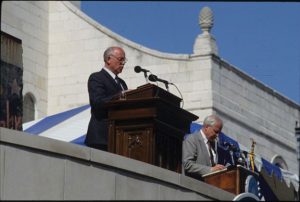 Photo courtesy of Missouri State Historical Society
Photo courtesy of Missouri State Historical SocietyMikhail Gorbachev, head of the Soviet Union, and President Reagan were responsible for ending the cold war and reducing the risk of a nuclear confrontation between the two countries.[/caption] How does our garden grow? One thing did grow. People. When Reagan became president our population was 226.5 million. The year he left office it had grown to 248.7 million, many of whom lost their jobs to outsourcing and mechanization. Nevertheless, in 1980, some 4,400 taxpayers reported income more than $1,000,000. By 1988 35,000 Americans were earning more than a million dollars annually. When Reagan was elected 13 percent of Americans were living below the poverty line. By 1988 it was still 13 percent. Play it again, Sam Coming into the eighties, Americans had been besieged with unpleasant events: The Vietnam War, counterculture movements, Watergate, and frustration with the condition of the country. Dreams were destroyed by inflation, high interest rates, and corruption in government. Crime was up. Youth was still seeking its own place in the American dream which seemed to be dipping down into nightmarish expectations. Education was more important because the increase in technology required college degrees, whereas a high school diploma had previously sufficed. Education was becoming more expensive to ordinary folks. Recreational money became tighter. Bars, films, designer apparel, records, fancy cars, and other pleasure pursuits were sharply curtailed due to a lack of funds to indulge in such forms of entertainment. Pop culture took a dramatic turn. Madonna and Cyndi Lauper loomed high among teenage idols, especially among young girls. Bangles, baubles, and beads were in style, as were bright colors, spandex, hoop earrings, teased hair, loud makeup, and neon clothing for both young girls and older women. Guys were into sweatpants, sweatshirts, denim jeans and jackets, wild colored thick, itchy sweaters and athletic shoes. [caption id="attachment_8919" align="alignright" width="201"]
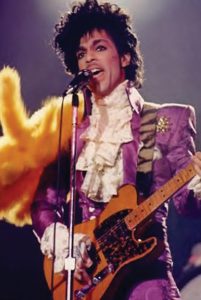 Photo source: www.prince.org
Photo source: www.prince.orgPrince performing during the fifth concert tour “The purple rain.”[/caption] The movie and television resurgence The eighties was the decade of blockbuster films, with such epic productions as The Empire Strikes Back, Indiana Jones, Back to the Future, all of which grossed millions of dollars at the box office. Sequels were quick to follow and just as successful at the box-office. Ferris Bueller’s Day Off, Fast Times at Ridgemont High and Revenge of the Nerds satisfied the middle teen set. The big three in television, CBS, ABC and NBC began to lose their grip on audiences as new innovations came into existence: MTV, ESPN, HBO, CNN, Nickelodeon were grabbing big shares of the viewing audience. By 1990, what you used to get for free on television had a price and it has continued to grow until today it is not uncommon to pay $200 a month for TV and internet access and any number of extra entertainment charges. Sadly, a pop icon’s death on December 8, 1980 left not only the country, but the world grieving. John Lennon exiting the Dakota Apartments in New York was shot and killed by a disillusioned fan, Mark Chapman. The 1980s brought a resurgence of heavy metal, new wave, hip-hop, rap, heavy metal and other genres of music. Because of economics, musical stars contributed to lowering the cost of popular entertainment by participating in charity concerts—Band Aid, We Are the World, Live Aid, and Farm Aid concerts. Many pop stars peaked in the eighties. Million-seller albums were among the following: Michael Jackson presented “Beat it,” “Billie Jean,” and “Thriller.’ Madonna brought us “Like a Virgin,” “Material Girl,” and “Crazy For You.” Prince gave us “Little Red Corvette,” “Delirious,” and the eternal “Purple Rain.” Then came Bono with “U Got the Look, “I could Never Take the Place of Your man,” and dozens of other hits. He also became a great humanitarian which gave him an adult audience. Bruce Springsteen, Phil Collins, Dire Straits, Queen, The Police, Rolling Stones (their popularity carried over from the sixties) and Whitney Houston. Renewed careers: Paul McCartney, Cher, Diana Ross, and Lionel Richie. Compact discs (invented in the 1960s) became commercially popular in the eighties as did audio cassettes and Walkmans, which were the iPods of the eighties. Yuppies replaced hippies. [caption id="attachment_8917" align="alignleft" width="186"]
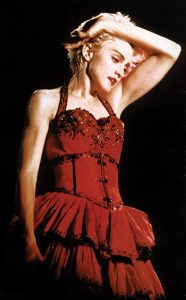 Photo source: www.wikipedia.com / CC-BY-SA
Photo source: www.wikipedia.com / CC-BY-SAMadonna performing on August 26, 1987, during the Who’s That Girl World Tour, 1987. [/caption] The bad seeds There were also some very stinky weeds growing in Reagan’s administration, which sprung up due to his policies and confidants he allowed to ill-advise him. Mental health deteriorated under Reagan as he slashed funding by 30 percent, which should not have come as a surprise since, as governor of California, he closed the mental hospitals. He supported Islamic terrorists, gave them almost $5 billion in taxpayer money, and even invited them to the White House as “freedom fighters.” His deregulation of the banking industry brought about the failure of 747 savings and loan institutions, and set the stage for the Keating Five scandal, which involved five sitting senators using taxpayer money to finance elections. Over 20 high ranking EPA employees were removed from their positions, and some were imprisoned. A scheme to fix elections with taxpayer money became known as “Sewergate.” Reagan’s people and the CIA conspired with the Contra’s during the Iran-Contra scandal to smuggle cocaine from South America into the United States, shielding drug smugglers from investigations. Top officials at the White House, including Oliver North, began to nurture cocaine smuggling, funneling the proceeds to the Contra army in Nicaragua. As part of the Iran-Contra scandal the administration sold weapons to Iran to fund Contra terrorists in Nicaragua. As a result of our support of Contra terrorists, the Contras kidnaped and tortured civilians, raping women and executing civilians, including children. By the time it all ended, 50,000 people died in the Contra killing spree. Tell me something good To Reagan’s credit and our benefit, he never let up trying to end the cold war that began when Harry S. Truman was president. Reagan’s legacy of finally ending the cold war will always outshine his darker deeds. Prior to Mikhail Gorbachev’s becoming the Soviet Premier, Reagan denounced the Soviet Union as an “evil empire.” Gorbachev came to power during the early stages of Reagan’s second term. During the business of diplomacy with “Gorby,” Reagan managed what his six predecessors in the White House had attempted, but failed to do—establish a friendly relationship with a Soviet dictator. Nikita Khrushchev’s “peaceful coexistence,” known as detente, was not Reagan’s idea of world peace. Much of what happened was initiated by Gorbachev who was determined to take his country into a radically different direction. Reagan understood the Soviet leader’s intentions and encouraged them because American interests would profit from such a change. Prior to their first meeting in Geneva, Reagan set up a plan to entice Gorbachev. He would look for areas of common interest to support Gorbachev’s reforms without being overbearing or insulting. He warned his party to “not rub Gorbachev’s nose” in any concessions he might make to us. [caption id="attachment_8918" align="alignright" width="169"]
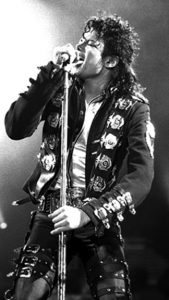 Photo source: www.wikipedia.com / CC-BY-SA
Photo source: www.wikipedia.com / CC-BY-SAMichael Jackson performing in June 2, 1988. “Wiener Stadion” venue in Vienna, Austria.[/caption] Reagan was successful in convincing Gorbachev that the United States did not pose any threat to the Soviets. It was during that period when Reagan adopted the famous phrase for the benefit of Gorbachev, “Trust but verify,” which was actually taken from an old Russian proverb. In spite of his advisors’ warnings that there was “no potential benefit in negotiating anything with the Soviets,” Reagan took his own path. All of his meetings and communications were brought to fruition when Reagan addressed the Soviet leader head-on with, “Mr. Gorbachev tear down that wall.” That set the stage for the Berlin Wall to come crashing down and a new American-Soviet era of diplomacy was set in motion after which we stopped worrying about a war between Russia and the United States. The eighties ended on a good note. Things were looking up. We were at peace with the world. How long would it last? Only the future could know that. I’ll bet that many of you who survived those times have forgotten how close we came to nuclear conflict and how smoothly two world leaders made peace for their families and their countries. The world slept better as George H. W. Bush took the oath of office in January 1989 as our 41st President. Just sayin’ rustystrait@gmail.com [caption id="attachment_8923" align="aligncenter" width="576"]
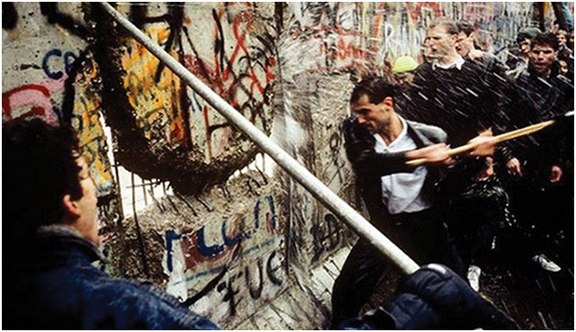 Photo courtesy of New York Times Education
Photo courtesy of New York Times EducationEcstatic crowds swarmed the Berlin Wall on Nov. 9, 1989, after the East German Communists announced that citizens could cross into West Berlin whenever they wanted.[/caption]
Soboba Band of Luiseño Indians
staffLeprechauns bring lots of green to Soboba Tribal Preschool
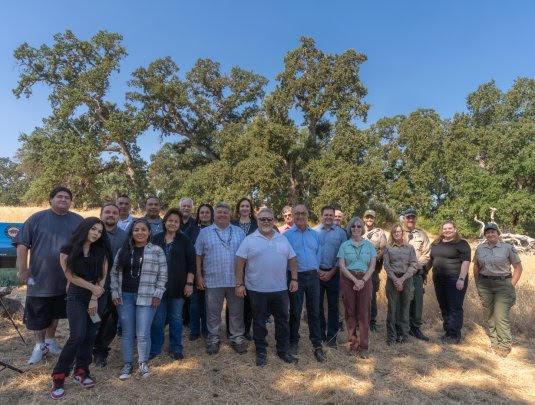 English, Valley Chronicle: Thu, Feb 25, 2021
English, Valley Chronicle: Thu, Feb 25, 2021
Koi Nation of Northern California and California State Parks
staffKoi Nation of Northern California, USA
English, Valley Chronicle: Thu, Dec 8, 2022
24 Kids Shop with a Cop in Hemet
staff24 Kids Shop with a Cop in Hemet
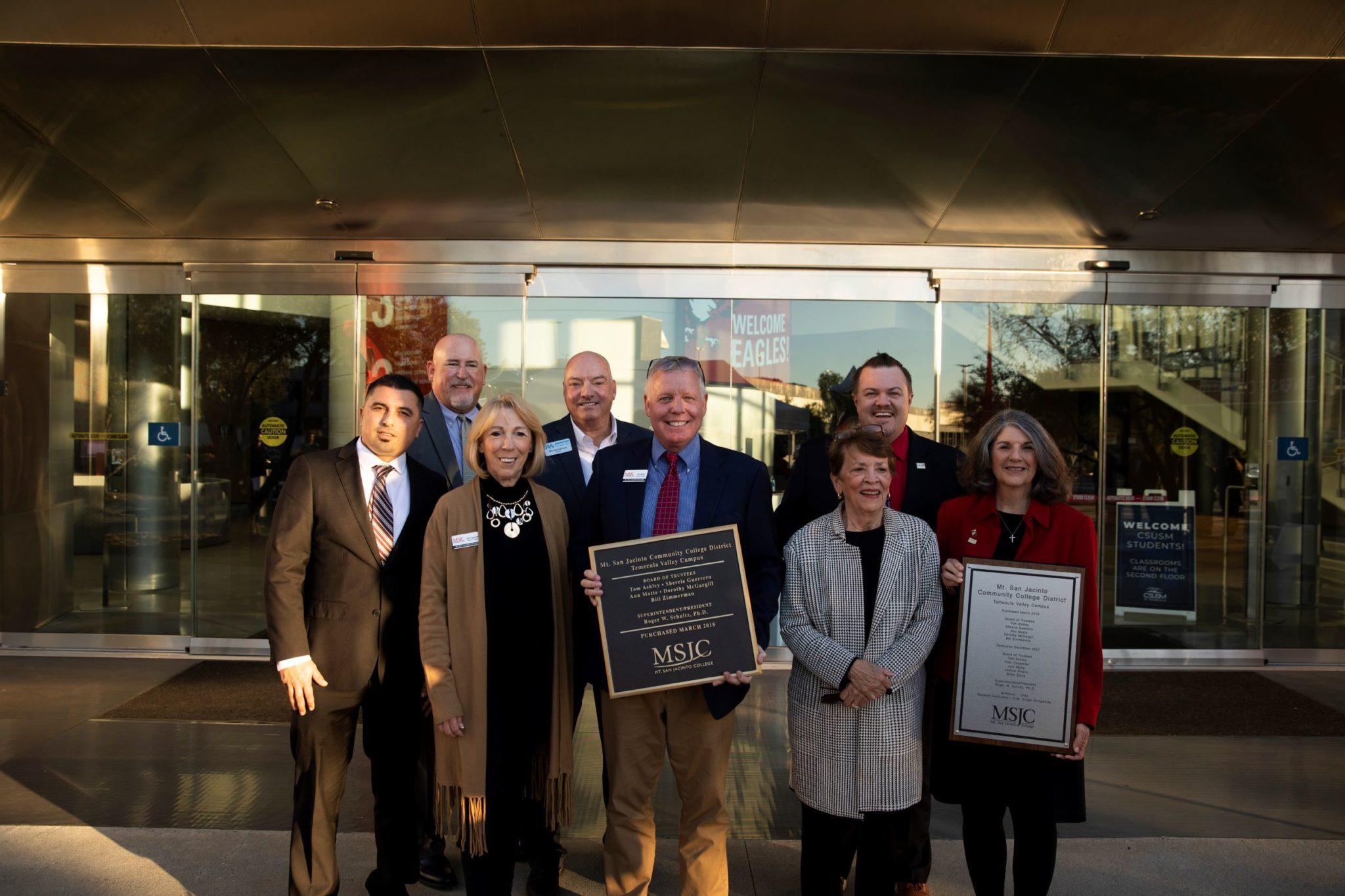 English, Valley Chronicle: Thu, Dec 8, 2022
English, Valley Chronicle: Thu, Dec 8, 2022
MSJC Hosts Temecula Valley Campus Dedication Ceremony
staffMSJC Hosts Temecula Valley Campus Dedication Ceremony
English, Valley Chronicle: Thu, Dec 8, 2022
NFPA urges added caution this holiday season, as Christ
staffNFPA urges added caution this holiday season, as Christmas Day and Christmas Eve are among the leading days of the year for U.S. home fires
English, Valley Chronicle: Thu, Dec 8, 2022
Stick to a “Go Safely” Game Plan: Celebrate the Holiday
staffStick to a “Go Safely” Game Plan: Celebrate the Holiday Season Responsibly National “Drive Sober or Get Pulled Over” Enforcement Campaign Begins Dec. 14
English, Valley Chronicle: Thu, Oct 27, 2022
Padilla Hosts Virtual Federal Student Debt Relief Brief
staffPadilla Hosts Virtual Federal Student Debt Relief Briefing to Encourage Californians to Apply
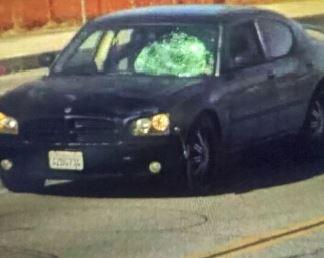 English, Valley Chronicle: Thu, Jun 9, 2022
English, Valley Chronicle: Thu, Jun 9, 2022
Police Seek Help Locating Hit-and-Run Vehicle
staffPolice Seek Help Locating Hit-and-Run Vehicle
 English, Valley Chronicle: Thu, Jun 9, 2022
English, Valley Chronicle: Thu, Jun 9, 2022
Four CSUSB alumni win top award for radio show
staffFour CSUSB alumni win top award for radio show
English, Valley Chronicle: Thu, Jun 9, 2022
Follow-up: Plane Crashes Near Residential Homes in Heme
staffFollow-up: Plane Crashes Near Residential Homes in Hemet
English, Valley Chronicle: Thu, Jun 9, 2022
CSUSB Nursing Street Medicine Program partners with new
staffCSUSB Nursing Street Medicine Program partners with new mobile medical clinic
English, Valley Chronicle: Thu, Jun 9, 2022
Padilla Joins Farm Workers for a Workday as Part of the
staffPadilla Joins Farm Workers for a Workday as Part of the ‘Take Our Jobs’ Campaign
English, Valley Chronicle: Thu, Mar 24, 2022
CHP plans DUI checkpoint in Hemet Valley
staffCHP plans DUI checkpoint in Hemet Valley
English, Valley Chronicle: Thu, Mar 24, 2022
Don't undermine scientific discovery -- ever, but espec
staffDon't undermine scientific discovery -- ever, but especially now
English, Valley Chronicle: Thu, Mar 24, 2022
C.W. Driver companies breaks ground on new three-story
staffC.W. Driver companies breaks ground on new three-story stem education building
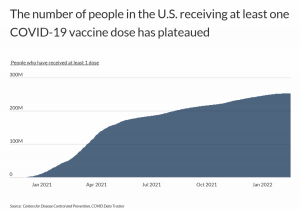 English, Valley Chronicle: Thu, Mar 24, 2022
English, Valley Chronicle: Thu, Mar 24, 2022
35.3% Of Unvaccinated California Residents Cite Governm
staff35.3% Of Unvaccinated California Residents Cite Government Distrust
English, Valley Chronicle: Thu, Mar 24, 2022
ICYMI: Padilla Highlights From Judge Jackson’s Supreme
staffICYMI: Padilla Highlights From Judge Jackson’s Supreme Court Confirmation Hearing
English, Valley Chronicle: Thu, Mar 24, 2022
MSJC Celebrates Groundbreaking of New STEM Building and
staffMSJC Celebrates Groundbreaking of New STEM Building and Opening of New Animatronic Makerspace
English, Valley Chronicle: Thu, Mar 3, 2022
MSJC Receives $500,000 Apprenticeship Grant
staffMSJC Receives $500,000 Apprenticeship Grant
America’s changing lifestyles, Part 7: D.C. goes to Hollywood
 Photo courtesy U.S. Government
Photo courtesy U.S. GovernmentReagan signed numerous bills in the early months of his presidency, stimulating economic growth, curbing inflation, increasing employment and strengthening national defense.[/caption] ■ By Rusty Strait / Senior Reporter The 1980 presidential race, even with three major candidates, was a cake walk for the former actor and Governor of California. Ronald Reagan swept into the White House (garnering 489 electoral votes), with his “kitchen cabinet” in tow. His would certainly head the most important Republican administration since Gen. Dwight Eisenhower. When Reagan took office for his first term, the country was in a quagmire of inflation and out-of-control interest rates. He hardly had chance to get his feet on the ground when he was shot in the side, inches from his heart, by an assassin. Let’s get to work Not since Roosevelt’s New Deal has a president signed so many bills in the early months of his presidency, stimulating economic growth, curbing inflation, increasing employment and strengthening national defense. He overhauled the income tax code and inaugurated the Reagan Doctrine which gave aid and assistance to anti-Communist insurgencies around the world. In one year, unemployment decreased and would continue to do so. Digging out of inflation was costly in the interim but profitable in the long run. Wages rose by 10 percent in 1980. The president was off to a good start. What happened to the middle class? There is much talk today about the declining middle class as though it is just now an issue. Not true. The so called “middle class,” has been declining for at least 50 years. Post World War II through the Vietnam War era we had the largest middle class in the history of the country. It has been decreasing ever since. Global competition has eaten away at American business profits. Business began in the seventies to shift to speculation, investing offshore, and outsourcing labor and manufacturing where labor and production costs were less. So much for corporate patriotism. Although Reagan had been a union leader throughout his film career, as President, he continued to weaken the labor pool and began the spiral that has almost destroyed labor unions. His administration began the “union bashing” that continues today. He also froze the minimum wage level for a nine-year period, essentially cutting pay each year while inflation bit into lower wage earners, while the salaries of corporate electives skyrocketed. Corporate presidents were earning 30 times more than factory workers during his early years and by the time he left office they were almost 130 times more as the big cats took larger slices of the profits. Employment in the manufacturing area fell 12 percent through the eighties. [caption id="attachment_8916" align="alignleft" width="300"]
 Photo courtesy of Missouri State Historical Society
Photo courtesy of Missouri State Historical SocietyMikhail Gorbachev, head of the Soviet Union, and President Reagan were responsible for ending the cold war and reducing the risk of a nuclear confrontation between the two countries.[/caption] How does our garden grow? One thing did grow. People. When Reagan became president our population was 226.5 million. The year he left office it had grown to 248.7 million, many of whom lost their jobs to outsourcing and mechanization. Nevertheless, in 1980, some 4,400 taxpayers reported income more than $1,000,000. By 1988 35,000 Americans were earning more than a million dollars annually. When Reagan was elected 13 percent of Americans were living below the poverty line. By 1988 it was still 13 percent. Play it again, Sam Coming into the eighties, Americans had been besieged with unpleasant events: The Vietnam War, counterculture movements, Watergate, and frustration with the condition of the country. Dreams were destroyed by inflation, high interest rates, and corruption in government. Crime was up. Youth was still seeking its own place in the American dream which seemed to be dipping down into nightmarish expectations. Education was more important because the increase in technology required college degrees, whereas a high school diploma had previously sufficed. Education was becoming more expensive to ordinary folks. Recreational money became tighter. Bars, films, designer apparel, records, fancy cars, and other pleasure pursuits were sharply curtailed due to a lack of funds to indulge in such forms of entertainment. Pop culture took a dramatic turn. Madonna and Cyndi Lauper loomed high among teenage idols, especially among young girls. Bangles, baubles, and beads were in style, as were bright colors, spandex, hoop earrings, teased hair, loud makeup, and neon clothing for both young girls and older women. Guys were into sweatpants, sweatshirts, denim jeans and jackets, wild colored thick, itchy sweaters and athletic shoes. [caption id="attachment_8919" align="alignright" width="201"]
 Photo source: www.prince.org
Photo source: www.prince.orgPrince performing during the fifth concert tour “The purple rain.”[/caption] The movie and television resurgence The eighties was the decade of blockbuster films, with such epic productions as The Empire Strikes Back, Indiana Jones, Back to the Future, all of which grossed millions of dollars at the box office. Sequels were quick to follow and just as successful at the box-office. Ferris Bueller’s Day Off, Fast Times at Ridgemont High and Revenge of the Nerds satisfied the middle teen set. The big three in television, CBS, ABC and NBC began to lose their grip on audiences as new innovations came into existence: MTV, ESPN, HBO, CNN, Nickelodeon were grabbing big shares of the viewing audience. By 1990, what you used to get for free on television had a price and it has continued to grow until today it is not uncommon to pay $200 a month for TV and internet access and any number of extra entertainment charges. Sadly, a pop icon’s death on December 8, 1980 left not only the country, but the world grieving. John Lennon exiting the Dakota Apartments in New York was shot and killed by a disillusioned fan, Mark Chapman. The 1980s brought a resurgence of heavy metal, new wave, hip-hop, rap, heavy metal and other genres of music. Because of economics, musical stars contributed to lowering the cost of popular entertainment by participating in charity concerts—Band Aid, We Are the World, Live Aid, and Farm Aid concerts. Many pop stars peaked in the eighties. Million-seller albums were among the following: Michael Jackson presented “Beat it,” “Billie Jean,” and “Thriller.’ Madonna brought us “Like a Virgin,” “Material Girl,” and “Crazy For You.” Prince gave us “Little Red Corvette,” “Delirious,” and the eternal “Purple Rain.” Then came Bono with “U Got the Look, “I could Never Take the Place of Your man,” and dozens of other hits. He also became a great humanitarian which gave him an adult audience. Bruce Springsteen, Phil Collins, Dire Straits, Queen, The Police, Rolling Stones (their popularity carried over from the sixties) and Whitney Houston. Renewed careers: Paul McCartney, Cher, Diana Ross, and Lionel Richie. Compact discs (invented in the 1960s) became commercially popular in the eighties as did audio cassettes and Walkmans, which were the iPods of the eighties. Yuppies replaced hippies. [caption id="attachment_8917" align="alignleft" width="186"]
 Photo source: www.wikipedia.com / CC-BY-SA
Photo source: www.wikipedia.com / CC-BY-SAMadonna performing on August 26, 1987, during the Who’s That Girl World Tour, 1987. [/caption] The bad seeds There were also some very stinky weeds growing in Reagan’s administration, which sprung up due to his policies and confidants he allowed to ill-advise him. Mental health deteriorated under Reagan as he slashed funding by 30 percent, which should not have come as a surprise since, as governor of California, he closed the mental hospitals. He supported Islamic terrorists, gave them almost $5 billion in taxpayer money, and even invited them to the White House as “freedom fighters.” His deregulation of the banking industry brought about the failure of 747 savings and loan institutions, and set the stage for the Keating Five scandal, which involved five sitting senators using taxpayer money to finance elections. Over 20 high ranking EPA employees were removed from their positions, and some were imprisoned. A scheme to fix elections with taxpayer money became known as “Sewergate.” Reagan’s people and the CIA conspired with the Contra’s during the Iran-Contra scandal to smuggle cocaine from South America into the United States, shielding drug smugglers from investigations. Top officials at the White House, including Oliver North, began to nurture cocaine smuggling, funneling the proceeds to the Contra army in Nicaragua. As part of the Iran-Contra scandal the administration sold weapons to Iran to fund Contra terrorists in Nicaragua. As a result of our support of Contra terrorists, the Contras kidnaped and tortured civilians, raping women and executing civilians, including children. By the time it all ended, 50,000 people died in the Contra killing spree. Tell me something good To Reagan’s credit and our benefit, he never let up trying to end the cold war that began when Harry S. Truman was president. Reagan’s legacy of finally ending the cold war will always outshine his darker deeds. Prior to Mikhail Gorbachev’s becoming the Soviet Premier, Reagan denounced the Soviet Union as an “evil empire.” Gorbachev came to power during the early stages of Reagan’s second term. During the business of diplomacy with “Gorby,” Reagan managed what his six predecessors in the White House had attempted, but failed to do—establish a friendly relationship with a Soviet dictator. Nikita Khrushchev’s “peaceful coexistence,” known as detente, was not Reagan’s idea of world peace. Much of what happened was initiated by Gorbachev who was determined to take his country into a radically different direction. Reagan understood the Soviet leader’s intentions and encouraged them because American interests would profit from such a change. Prior to their first meeting in Geneva, Reagan set up a plan to entice Gorbachev. He would look for areas of common interest to support Gorbachev’s reforms without being overbearing or insulting. He warned his party to “not rub Gorbachev’s nose” in any concessions he might make to us. [caption id="attachment_8918" align="alignright" width="169"]
 Photo source: www.wikipedia.com / CC-BY-SA
Photo source: www.wikipedia.com / CC-BY-SAMichael Jackson performing in June 2, 1988. “Wiener Stadion” venue in Vienna, Austria.[/caption] Reagan was successful in convincing Gorbachev that the United States did not pose any threat to the Soviets. It was during that period when Reagan adopted the famous phrase for the benefit of Gorbachev, “Trust but verify,” which was actually taken from an old Russian proverb. In spite of his advisors’ warnings that there was “no potential benefit in negotiating anything with the Soviets,” Reagan took his own path. All of his meetings and communications were brought to fruition when Reagan addressed the Soviet leader head-on with, “Mr. Gorbachev tear down that wall.” That set the stage for the Berlin Wall to come crashing down and a new American-Soviet era of diplomacy was set in motion after which we stopped worrying about a war between Russia and the United States. The eighties ended on a good note. Things were looking up. We were at peace with the world. How long would it last? Only the future could know that. I’ll bet that many of you who survived those times have forgotten how close we came to nuclear conflict and how smoothly two world leaders made peace for their families and their countries. The world slept better as George H. W. Bush took the oath of office in January 1989 as our 41st President. Just sayin’ rustystrait@gmail.com [caption id="attachment_8923" align="aligncenter" width="576"]
 Photo courtesy of New York Times Education
Photo courtesy of New York Times EducationEcstatic crowds swarmed the Berlin Wall on Nov. 9, 1989, after the East German Communists announced that citizens could cross into West Berlin whenever they wanted.[/caption]
The Valley Chronicle - America’s changing lifestyles, Part 7: D.C. goe
America’s changing lifestyles, Part 7: D.C. goes to Hollywood

Koi Nation of Northern California and California State Parks Renew Memorandum of Understanding and Celebrate Renaming of Ridge and Trail
Koi Nation of Northern California, USA

MSJC Hosts Temecula Valley Campus Dedication Ceremony
MSJC Hosts Temecula Valley Campus Dedication Ceremony
Stick to a “Go Safely” Game Plan: Celebrate the Holiday
Stick to a “Go Safely” Game Plan: Celebrate the Holiday Season Responsibly National “Drive Sober or Get Pulled Over” Enforcement Campaign Begins Dec. 14

Police Seek Help Locating Hit-and-Run Vehicle
Police Seek Help Locating Hit-and-Run Vehicle
Follow-up: Plane Crashes Near Residential Homes in Hemet
Follow-up: Plane Crashes Near Residential Homes in Hemet
Padilla Joins Farm Workers for a Workday as Part of the
Padilla Joins Farm Workers for a Workday as Part of the ‘Take Our Jobs’ Campaign
Don't undermine scientific discovery -- ever, but espec
Don't undermine scientific discovery -- ever, but especially now

35.3% Of Unvaccinated California Residents Cite Governm
35.3% Of Unvaccinated California Residents Cite Government Distrust
MSJC Celebrates Groundbreaking of New STEM Building and
MSJC Celebrates Groundbreaking of New STEM Building and Opening of New Animatronic Makerspace
MSJC Receives $500,000 Apprenticeship Grant
MSJC Receives $500,000 Apprenticeship Grant
24 Kids Shop with a Cop in Hemet
24 Kids Shop with a Cop in Hemet
Stick to a “Go Safely” Game Plan: Celebrate the Holiday
Stick to a “Go Safely” Game Plan: Celebrate the Holiday Season Responsibly National “Drive Sober or Get Pulled Over” Enforcement Campaign Begins Dec. 14

Four CSUSB alumni win top award for radio show
Four CSUSB alumni win top award for radio show
Padilla Joins Farm Workers for a Workday as Part of the
Padilla Joins Farm Workers for a Workday as Part of the ‘Take Our Jobs’ Campaign
C.W. Driver companies breaks ground on new three-story
C.W. Driver companies breaks ground on new three-story stem education building
MSJC Celebrates Groundbreaking of New STEM Building and
MSJC Celebrates Groundbreaking of New STEM Building and Opening of New Animatronic Makerspace










